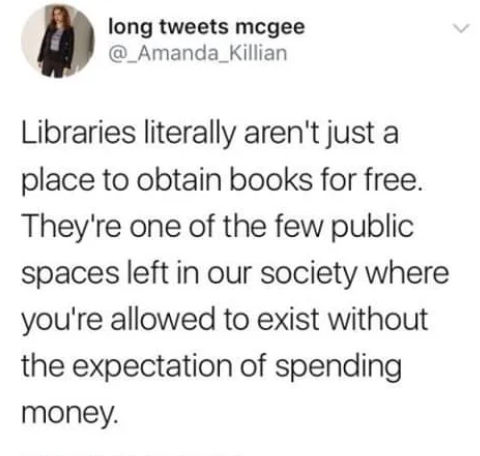this post was submitted on 17 Apr 2025
969 points (99.3% liked)
Microblog Memes
7438 readers
3212 users here now
A place to share screenshots of Microblog posts, whether from Mastodon, tumblr, ~~Twitter~~ X, KBin, Threads or elsewhere.
Created as an evolution of White People Twitter and other tweet-capture subreddits.
Rules:
- Please put at least one word relevant to the post in the post title.
- Be nice.
- No advertising, brand promotion or guerilla marketing.
- Posters are encouraged to link to the toot or tweet etc in the description of posts.
Related communities:
founded 2 years ago
MODERATORS
you are viewing a single comment's thread
view the rest of the comments
view the rest of the comments

I was just discussing with a friend yesterday that lots of moments in the Spider-Man 2 videogame that are presented as being "New York" things, like people playing chess in a park, paint a pretty bleak picture of the rest of the US.
At least looking from this side of the Atlantic it seems that most Americans spend all of their time between home, work, consumption places, or in a car between those places. So they basically switch between being prisoners in a form of house arrest and being customers, leaving no space to be actual free people.
A very large number of Americans spend a lot of time watching sporting events. These are ostensibly free (sort of, given that people usually pay for cable or streaming anyway) except that lots of people watch because they're gambling. Gambling is of course also a fee and a monstrous one at that, but it at least has the advantage of not really feeling like a fee.
What are your third places that don't require money?
(Don't say parks. Yes, we have parks. Everywhere I've ever lived, red or blue, has an abundance of parks. Yes within walking distance.)
Sidewalks. If I have leisure time out of the house I’m probably walking my dog. It’s amazing how talkative my teens get when you’re out walking for an extended period!
My Spring goal is the dog gets at least one walk longer than 2 miles every day, longer than 3 miles on weekends.
Ironically it’s the park that’s expensive. Part of the tradition is to grab takeout to eat on a bench on the town common, and we’re lucky to have restaurants from many different culinary traditions. Our favorite since Pandemic is a Pakistani kebab place but our second is a Turkish kebab place for contrast
Accurate. Depending on where you live, there may be more third places available, but they're often something you really have to make an effort to find.
So much of that is about public transit.
When everyone travels by car, there's not much space for walking around or standing around. Places where people walk around or stand around become places for buskers, artists, small vendors, etc. That turns that space from just a place you pass by into a destination itself.
The other half of the problem is winter. Most of Europe is fairly warm compared to most of the Americas. It's only really the nordic countries where the daily average high is below freezing. In more than half of the US it's below freezing for months on end. That means that public outdoor spaces are not really all that usable for just hanging out in the winter.
Part of the problem is cultural. Many of the colder places in Europe do outdoor Christmas markets. Those aren't exactly consumption-free places, but you can walk around and browse without paying. The US doesn't even do that, making the cold months a wasteland outdoors.
I don't know if there's anywhere in the world that does extensive consumption-free public spaces for use in winter. But, that's what would really be needed in the northern US and Canada.
All of the cold places I've lived in the US have holiday pop up markets. Some but not all of the warm places.
Even Detroit! I’m not surprised that they did it but they showcased the progress they’ve made turning things around to have a downtown worth visiting again!
Boston always has, my whole life. But yeah as the cities get smaller it may be less likely
All of these same issues are present in the warmer states as well, so that doesn't seem to make much difference.
Some of the south has public areas that aren't available to the north, like beaches.
But, I think it's a bad combination of multiple factors. Cities designed after cars became popular, vs. European cities where they tried to adapt cars to existing roads (while often keeping public squares etc.) Cities designed by European immigrants who came from warmer climates, and didn't plan for winter spaces. Cities designed by people who worship capitalism, vs. cities designed around a balance between capitalism and socialism.
Towns and cities built up before cars are more conducive to more people-centric activities and are likely to have more such traditions. Many cities in the northeast are like this, more “European”.
However most US cities and towns had large growth spurts after the car, all that new construction built up as car-centric. Basically 80 years of growth that we’re now seeing wasn’t the best choice. We have that 80 years to make back, 80 years of construction in the way, and it’s no longer fueled by fast growth.
I think it as somewhat similar to Europe rebuilding after the world wars. Both had huge building booms. The different choices were more from a point of privilege from not being bombed. Intact infrastructure and greater wealth from wartime industry and intact manufacturing tended toward different choices that were starting to regret